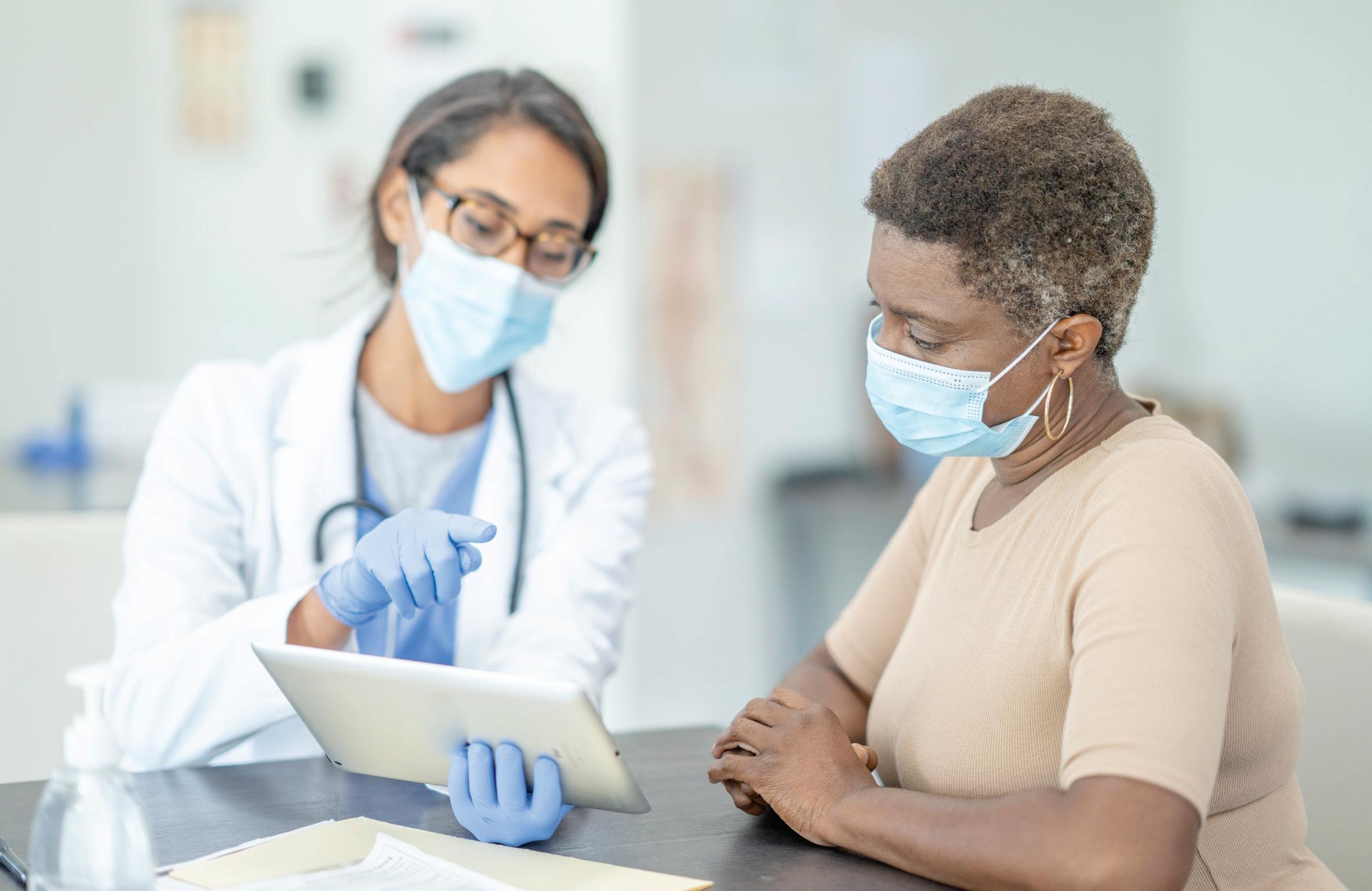
4 minute read
YOUR MAMMOGRAM LOOKS ABNORMAL. NOW WHAT?
A GUIDE TO HOW OUR MULTIDISCIPLINARY TEAMS DIAGNOSE AND MAY TREAT YOUR BREAST CANCER
RWJBarnabas Health and Robert Wood Johnson University Hospital Hamilton, in partnership with Rutgers Cancer Institute of New Jersey—the state’s only NCI-Designated Comprehensive Cancer Center—provide close-to-home access to the most advanced treatment options. Call 844.CANCERNJ or visit www.rwjbh.org/beatcancer.
It’s hard to overstate the impact of regular mammograms. “They are amazing screening tools,” says Firas Eladoumikdachi, MD, Breast Surgical Oncologist at Rutgers Cancer Institute of New Jersey and The Cancer Center at Robert Wood Johnson University Hospital (RWJUH) Hamilton. “They’re really lifesaving.”
Thanks to screening, most breast cancers are now detected in early stages when they are most easily treated. “There’s even a stage zero in which survival is close to 98 or 99 percent,” Dr. Eladoumikdachi says. “You can treat it and move on with life. These early cancers generally don’t affect life span at all.”
Yet many cancers are found at later stages or involve a complex mix of factors that affect care. And care itself can consist of a number of options from a range of specialists in multidisciplinary teams. “Cancer care is increasingly personalized,” says Deborah Toppmeyer, MD, Chief Medical Officer and Director of the Stacy Goldstein Breast Cancer Center at Rutgers Cancer Institute of New Jersey and breast medical oncologist at The Cancer Center at RWJUH Hamilton. “But it often starts with an abnormal mammogram.”
Once you’re found to have an abnormal mammogram, here is what you and your cancer team may do next.
FIND OUT MORE. The ordering physician (typically your primary care doctor or obstetrician/gynecologist) will review the report and discuss the findings further with the mammographer. The doctor will also look for physical signs like a lump or nipple discharge. You may need more imaging to get a clearer picture. GET A BIOPSY. If additional focused mammogram views continue to look suspicious, a breast surgeon or radiologist will perform a minimally invasive needle biopsy to obtain tissue samples for analysis. You may need surgery and/or other treatment if the biopsy finds cancer or high-risk cells— or if benign findings seem inconsistent with what is seen on your imaging studies, to assure that there is not an underlying malignancy that was not found on initial biopsy. MAKE A PLAN. You and your cancer team decide on the best course of treatment based on your priorities and what doctors recommend for optimal care. “Decisions entail back-andforth conversations between you and your providers about options, pros and cons,” Dr. Eladoumikdachi says. This is called shared decision making. A multidisciplinary tumor board consisting of doctors such as surgical and medical oncologists, radiologists, genetic specialists and plastic surgeons reviews your mammogram and biopsy results to develop an appropriate treatment plan.
CONSIDER SURGERY.
Typically a diagnosis of localized breast cancer requires surgery. Options include lumpectomy to remove the tumor and nearby tissue but preserve the breast or a mastectomy to remove the entire breast. For women at significantly increased risk of developing a subsequent breast cancer (for example, women who have a variant of significance in a gene that predisposes to breast cancer), double mastectomy may be considered.
You may have more options if cancer appears to be in the early stages. For example, lumpectomy may also require radiation treatment, while mastectomy for early-stage cancer may allow you to skip radiation.
STAGE THE CANCER.
Samples taken from lymph nodes will help reveal if cancer has spread beyond the breast.
RECEIVE ADDITIONAL
THERAPIES. Based in part on these findings, your breast cancer team will determine whether you need systemic treatment such as chemotherapy, hormonal therapy, other targeted therapies or a combination. Radiation to consolidate local control may also be considered depending on the type of surgery, lymph node status and tumor size.
UNDERGO BREAST
RECONSTRUCTION. Many women undergo breast reconstruction at the time of mastectomy or following completion of systemic and local therapy. Many options are available to discuss with a plastic surgeon who works closely with the breast surgeon. Conversations before surgery help the surgical team plan an optimal course of reconstructive treatment.
ENROLL IN A CLINICAL
TRIAL. Through RWJUH Hamilton’s partnership with Rutgers Cancer Institute of New Jersey, the state’s only National Cancer InstituteDesignated Comprehensive Cancer Center, patients have access to clinical trials that can provide advanced treatment options. “Clinical trials can provide access to novel therapies, new options for surgery, different methods of radiation therapy and more,” Dr. Toppmeyer says. “Through the participation of women and men in clinical trials, we have changed the natural history of breast cancer, both in early and advanced disease. If patients did not participate in clinical trials, we would not have made the extraordinary advances that we’ve seen, not only in breast cancer but other cancers as well.”
ARE YOU AT RISK OF BREAST CANCER?
Factors like these can influence your chances of developing breast cancer. • Family history: Risks are higher if a first-degree relative such as a mother or sister, or multiple family members on either side have had breast cancer. • Breast makeup: Dense breasts are more likely to develop breast cancer or evade cancer detection on mammograms. • Age: The older you are, the more likely you are to develop breast cancer, especially after age 50, when most breast cancer diagnoses are made. • Ethnic background: Breast cancer is often more aggressive in African
American women, whose lower screening rates also result in more cancers being detected at relatively advanced stages. Inherited genetic mutations related to breast cancer such as BRCA1 or BRCA2 are also more common in the Ashkenazi
Jewish population. • Reproductive history: Having your first menstrual period before 12 or starting menopause after 55 both increase your risk for breast cancer because they increase lifetime exposure to estrogen.
To learn more about the cancer care team at RWJUH Hamilton headed by Malini Patel, MD, Director of Medical Oncology, visit www.rwjbh.org/rwj-university-hospital-hamilton/treatment-care/cancer.










